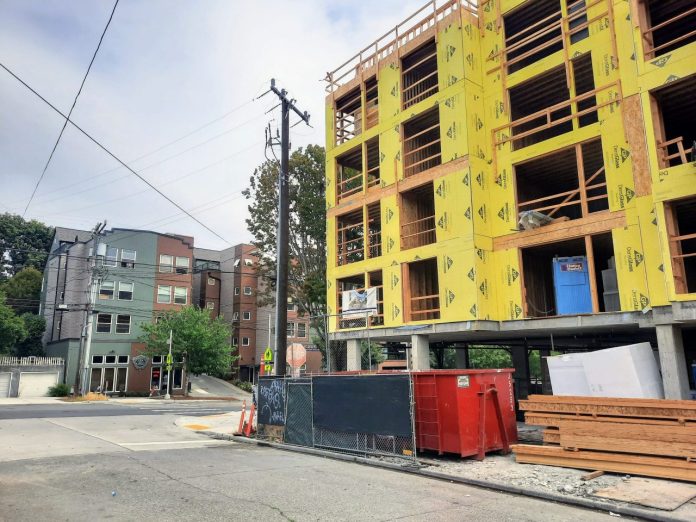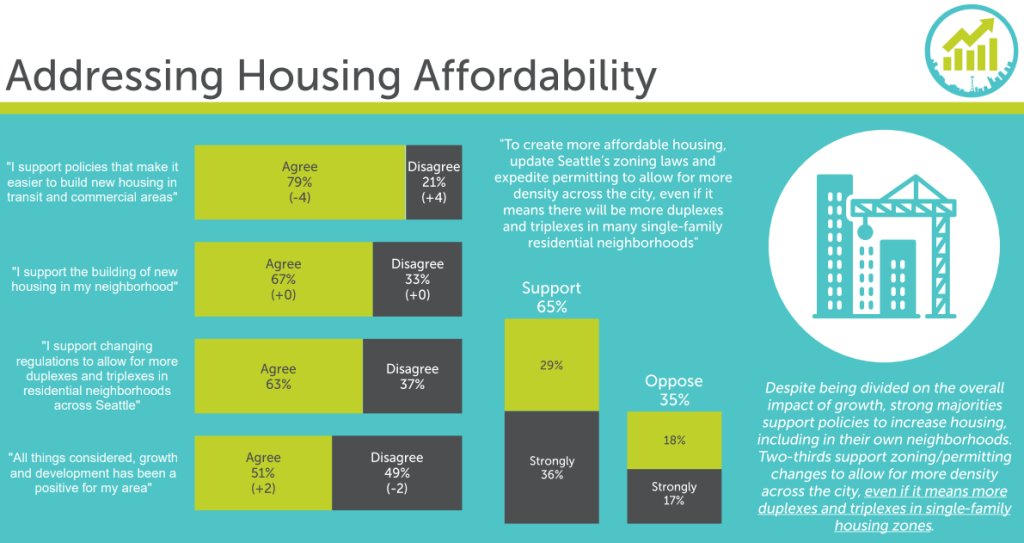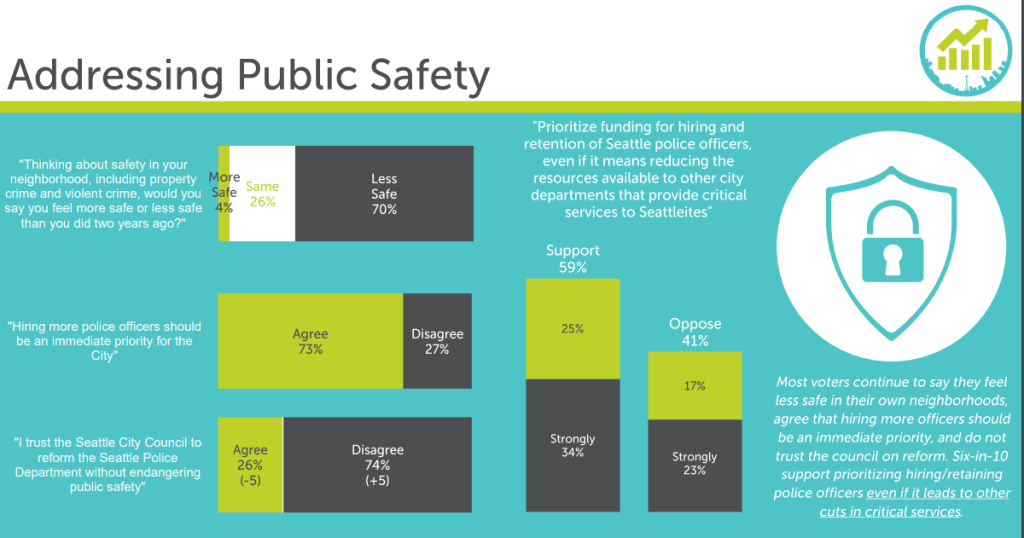
The Seattle Metropolitan Chamber of Commerce released its twice annual “Index” poll of Seattle voters today and found even stronger support for new housing than last time around, even when that came to replacing single family homes in respondents’ own neighborhoods. The poll (crosstabs) found 65% of respondents supported adding triplexes in “many single family neighborhoods,” which was up from 61% in a similar question in the chamber’s March poll.
While wrong track numbers were trending down from a high of 76% in March, they remained high at 69%. Just 30% responded that the city was headed in the right direction, which did mark an improvement. The chamber and its pollster EMC Research said overall the Index poll showed a gradual but positive trend, with fewer respondents saying they were contemplating leaving the region. Chamber CEO Rachel Smith stressed the support the poll found for homeless encampment removals and police hiring in her comments at a press conference this morning. She also found grounds for optimism.
“There are indications that voters believe that we are turning the corner,” Smith said. “Of note, again, homelessness is cooling as a top priority. And I think that’s in large part because people see that progress is being made. It’s slow progress, but it is progress. And again because we’re taking a regional approach and because public and private sector is working together, because there’s a visible difference, including for those experiencing homelessness. I believe that’s why you’re seeing that cooling.”
While the poll question focused on “duplexes and triplexes,” she said that the chamber is open to other housing types, such as the sixplexes and fourplexes that were considered in a statewide zoning reform bill (HB 1782) spearheaded by Rep. Jessica Bateman (D-Olympia) that is likely to return in 2023, perhaps in a modified form. The chamber supports that state legislative effort in addition to working reforms into Seattle’s the major Comprehensive Plan update due in 2024, Smith added.
“You see large numbers of people supporting more housing no matter how you ask the question,” Smith said. “For the chamber’s position, we are very supportive of policies and investments and regulatory changes that are going to allow for more housing… The chamber was very supportive of that legislation last year.”
Andrew Thibault, senior principal at EMC Research, added that the result was remarkable because in other cities, polling has tended to find support for new housing until the question as framed as the neighborhood level where respondents would oppose new housing in their midst. This localized opposition was not prevalent in Seattle, according to the Index poll.
Smith added that the chamber has been in talks with other housing advocates and coalition partners behind the push and expected statewide zoning reform legislation to come back next year.
“I think you will absolutely see [the chamber] supporting that,” Smith said. “Obviously, we haven’t seen the details yet, but our policy position is very supportive.”
She clarified that polling about triplexes wasn’t meant to mark an upward limit of what the chamber would support, or a snub of sixplexes, for instance.
Single family zoning accounts for about two-thirds of residential land in Seattle even as the city has grown rapidly over the past couple of decades. When it comes to apartments, Seattle has been a national leader in production, which has help the city accommodate more than 150,000 additional residents since 2010 — many of them recruited to the region to fill jobs at the fast-growing corporations that the chamber represents. Overall, Seattle hit 762,500 residents at the state’s last tally in April. However, many single family neighborhoods have remained stagnant, and some have actually shrunk in population over that time period.
Housing affordability remained the third-highest ranked issue of concern for Seattleites after homelessness and crime, which were also holdovers. Support for building “new housing in my neighborhood” remained steady at a resounding 67% of poll respondents.

These polling figures continue to suggest boldness and action when it comes to housing and zoning reform, or “big ball, not small ball” in the parlance of Mayor Bruce Harrell. But is the City of Seattle ready to pick up the ball and run with it? A scoping report due this fall should indicate what final alternatives made it into the City’s environmental impact study. Will the playing field be set up for big ball or small ball? Time will tell.
Crime concerns growing
The poll found support for some centrist and conservative positions on other topics, such as police hiring. For example, 73% of respondents agreed with this prompt: “Hiring more police officers should be an immediate priority for the City.” Moreover, support remained relatively high at 59% when framed as police hiring and retention spending “even if means reducing resources available to other City department’s that provide critical services to Seattleites.”

There could be some acquiescence bias going on here, since research has demonstrated poll respondents have a strong tendency to agree with the premise beyond their natural inclinations in agree/disagree questions. Nonetheless, it’s not a favorable data point for supporters of reducing police staffing. This poll would suggest voters are not yet convinced.
The Index poll did not directly tackle the issue of whether the voters would prioritize community-based alternatives and violence prevention programs. However, a recent Crosscut/Elway poll found strong support for these alternative public safety investments and tackling the root causes of crime — even more so than increasing police spending.
“When asked where they think the city should direct its resources to deal with crime, 92% of respondents said funding for more addiction and mental health services,” Crosscut‘s Josh Cohen reported. “Eighty-one percent want to see more de-escalation training for police officers, 80% want more social programs to address crime’s root causes, 75% want to add more nonpolice staffing, and 73% want to see an increase in court staffing to process the caseload.” Meanwhile, 64% of respondents supported hiring more police officers, while 28% wanted to cut spending on police officers in that poll.
Who to trust to fix Seattle’s top issues
On the other hand, acquiescence bias wasn’t enough to goad respondents into agreeing with the statement that “I trust the Seattle City Council to reform the Seattle Police Department without endangering public safety.” For this question, 26% agreed and 74% disagreed.
This question was interesting because the chamber poll did not ask if respondents trusted Mayor Harrell to reform the Seattle Police Department. In fact, this was the only question to bring up either the council or mayor specifically. Ironically, the Mayor is the official tasked with leading on reform as the executive, imbued with the power to hire and fire the police chief.
For his police chief pick, Mayor Harrell went with the status quo pick in interim police chief Adrian Diaz, a deputy chief under his predecessor, Carmen Best. Chief Best was criticized for approving use of tear gas on protesters and overseeing the blast balling of journalists who were covering the protests. She also oversaw the abandonment East Precinct and then helped cover up how those decisions were made by deleting texts, which are public records officially are legally required to retain, apparently in concert with Mayor Jenny Durkan, who repeatedly deleted her own text records and then lied about the coverup. Many advocates saw these actions as opposed to police reform and accountability efforts.
I asked Smith and Thibault why they didn’t ask the same police reform trust question of the mayor, and Smith indicated is was because Mayor Durkan supported increasing funding for the Seattle Police Department when they debuted that question in their August 2021 Index poll. “Reform” is standing in for defunding the police in this context, it seems. Thibault added that other research did suggest voters trusted Mayor Harrell more on the issue of police reform.
“Not from this survey, but from other work — we do a ton of research in Seattle — I can tell that the mayor has significantly higher levels of trust overall than the city council does,” Thibault said. “So that’s so going to bleed over into any question that you ask about. The distrust of the city council is going to bleed over into question of taxes, spending, public safety, and dealing with homelessness.”
Smith agreed trust was essential.
“Trust in government is really important,” Smith added. “We don’t gain trust by ignoring the distrust. We gain trust by rebuilding it and doing what we need to do civically and as a community to rebuild trust in government.”
In recent election cycles, considerable centrist campaign spending has also went into eroding trust in city council, which means the trust building work starts from a bigger hole. Nonetheless, the fate of many major public endeavors from building a world class transit network to decarbonizing the economy to adapting to climate change to building out supportive housing to end the homelessness crisis ride on building trust in government, which, like it or not, includes the Seattle City Council.
Doug Trumm is publisher of The Urbanist. An Urbanist writer since 2015, he dreams of pedestrian streets, bus lanes, and a mass-timber building spree to end our housing crisis. He graduated from the Evans School of Public Policy and Governance at the University of Washington in 2019. He lives in Seattle's Fremont neighborhood and loves to explore the city by foot and by bike.

